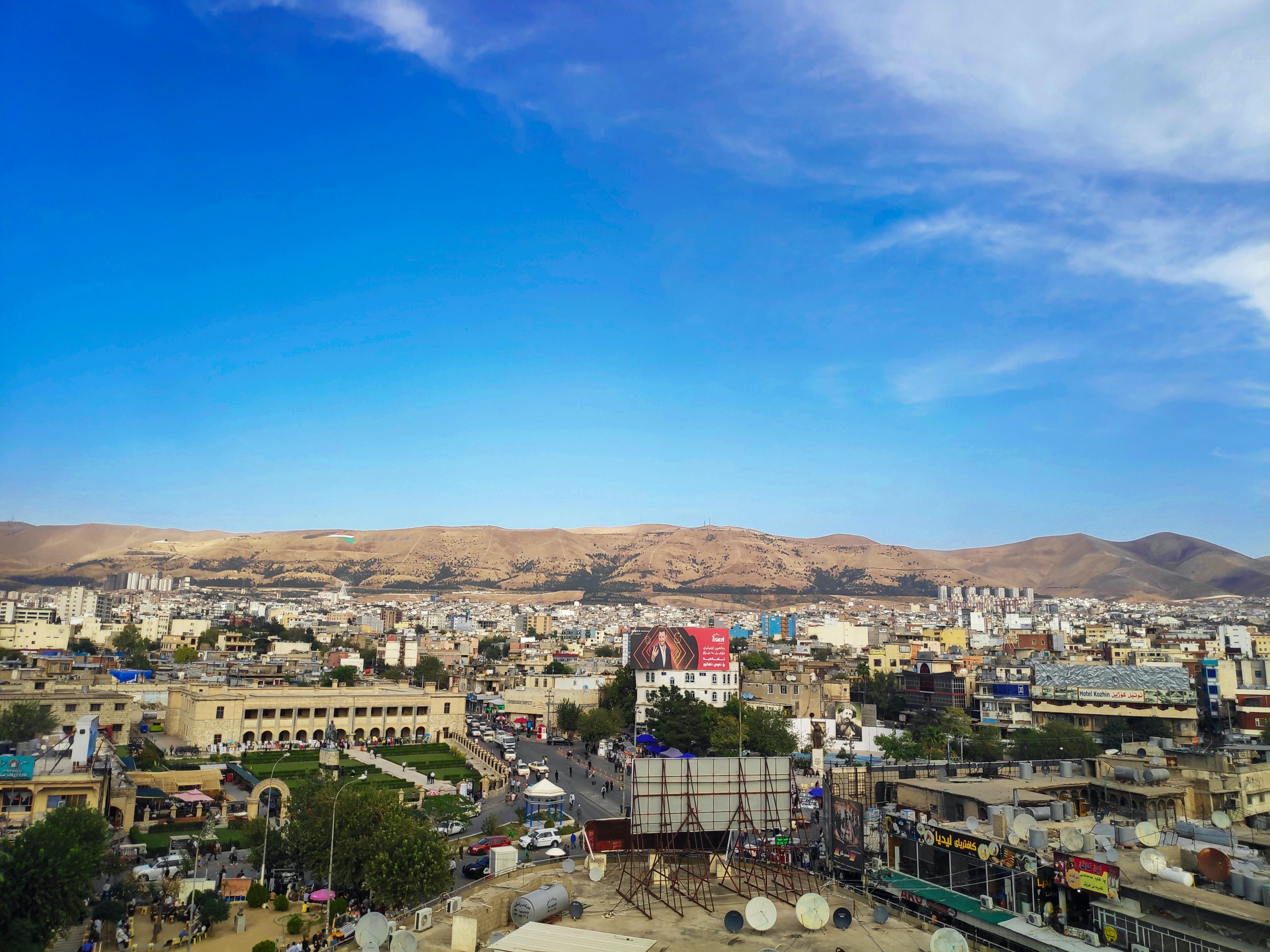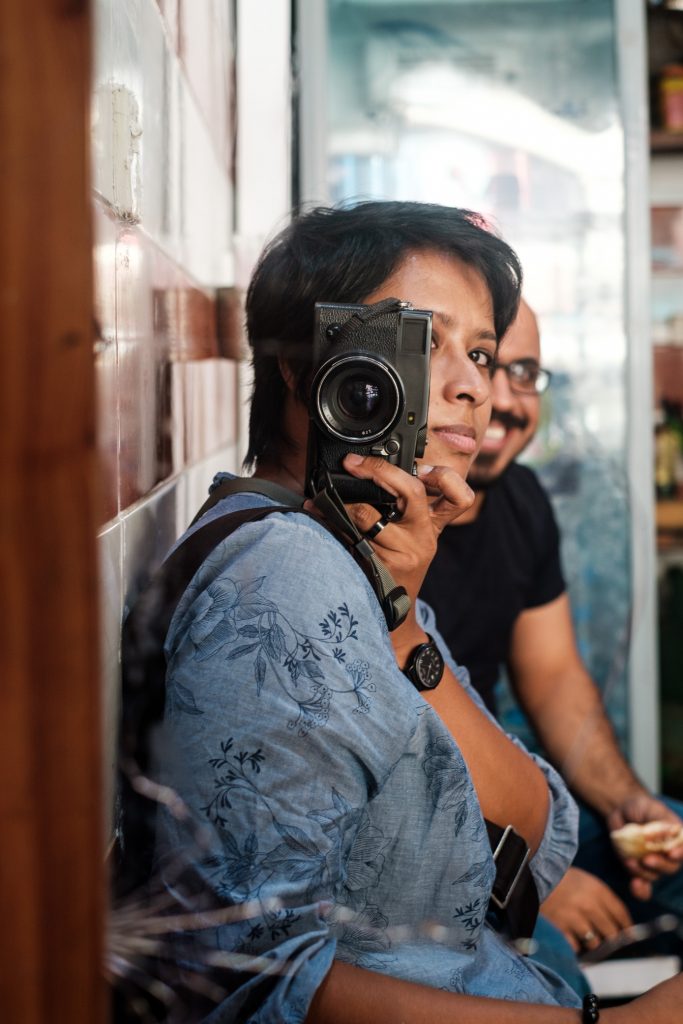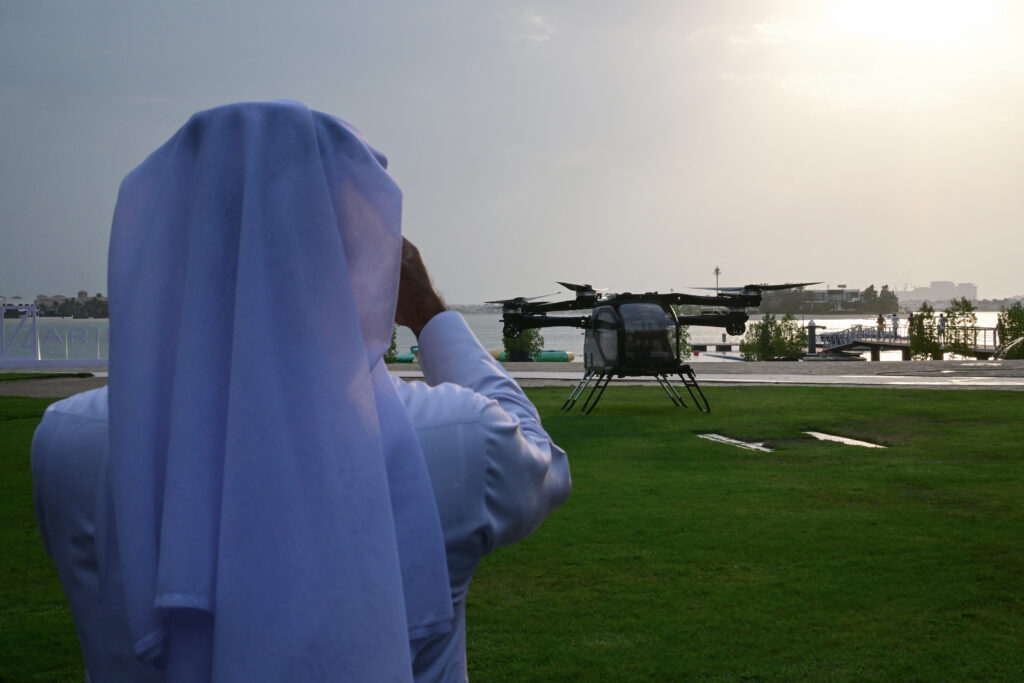
- 30 Oct 2020
[MEI Salon Series] Stories of Hope from Iraq
Abstract
What comes to mind when you think of Iraq? Deserts? Bombs? Soldiers? Destruction? Over the last 50 years, Iraq has seen multiple wars ― the Iran–Iraq war, the first Gulf war, the US invasion, the war with the Islamic State ― and the devastation that comes with prolonged conflict. Millions of lives were lost, and millions were displaced. What does ordinary life look like when you’re a refugee?
Ms Winfred spent a year in Kurdistan, the autonomous Kurdish region in northern Iraq, working for a small NGO helping refugees to rebuild their lives in the long shadow of war, and listening to the stories of many refugees. She was struck not only by how unimaginable these stories were to someone like her ― from safe, stable Singapore ― but unexpectedly, also by how much they resonated. These are stories most of us can identify with, no matter who we are, and where or how we live.
What do people who have lived in conflict long for, just like those who live in peace?
Join us for this public talk on 30 October 2020, 3.30pm to 5pm (SGT), which will be conducted online via Zoom. All are welcome to participate. An e-invite will be sent to you near the event date.
This event is free, however, registration is compulsory.
Photo by Zana Latif on Unsplash
Listen to the full event here:
Watch the full event here:
Read the Event Summary of “Stories of Hope from Iraq”
By Fadhil Yunus Alsagoff,
Research Assistant, Middle East Institute, National University of Singapore
In this MEI Salon session, photographer Charlene Winfred shared pictures and stories of her time in Iraq working as a communications officer for humanitarian NGO Preemptive Love.
A young girl making a snowman, some youths hanging out atop a hill overlooking Sulaymaniyah, and even a rave party in Kurdistan — these images of Iraq break the stereotypical media portrayal of the country as a war-torn, conflict-ridden zone. Showing these images of normalcy quite foreign to outsiders was how Ms Charlene Winfred chose to begin her presentation.
Proceeding to give a brief background of Preemptive Love, she said the humanitarian non-governmental organisation she was working with works with refugees and internally displaced people mostly in the Middle East and South America, including Syria, Lebanon, Venezuela, Mexico and Iraq. It provides emergency relief in conflict zones, an example being the recent Beirut blast, as well as aid in job creation. Its mission is to bring humanity together through building communities around the world that support peace. Ms Winfred, an avid photographer with over 10 years of experience, was based in the autonomous Kurdish region in northern Iraq, where she wrote stories, took pictures and made video for the NGO’s online platform.
She said that according to United Nations High Commission for Refugees (UNHCR), there were just under 280,000 refugees and 1.4 million internally displaces people in Iraq as of the end of 2019. She explained that while refugees are those who crossed international borders, internally displaced people are those who have lost and fled their homes but remain within the borders of their home country. The former are recognised and come under the protection of the UN and thus have access to aid, whereas the later are not recognised and have immense difficulty accessing aid and receiving protection.
Most of the people she worked with while in Iraq were internally displaced Iraqis. She showed participants a picture of what the displacement camp looks like: plastic shielded tents with extensions built using wooden poles that provide barely any warmth during the winter nor any coolness during the summer. With temperatures reaching 47 degrees Celsius in the summer and below freezing during the winter, the meagre shelters certainly make for difficult living.
Buthena
For her talk, Ms Winfred focused sharing stories of hope she and her colleagues experienced through the indivduals they met and worked with. The first was a lady named Buthena, who came from a town in central Iraq that was destroyed by the Islamic State (Isis). She was pregnant when Isis invaded her hometown. To make matters worse, her husband abandoned her after their fifth baby came along. She and her five children faced serious challenges in surviving. In Iraq, men are the traditional breadwinners of the household. But with so many men lost in wars and conflicts, women have to work to provide for families. However, the social and economic barriers are still extremely high, more so for those who live in camps, because of the thousands of people vying for jobs.
Buthena thus came to Preemptive Love for help. She wanted to start a salon and donors gave her US$1,000 to start her business. With the money, she bought a place in camp, a new tent, new tools and products, and furniture. Hers was the first salon business in a camp of approximately 10,000 internally displaced Iraqis. The salon quickly became more than just a salon; it also became a safe space where women came together to socialise and share about their lives. Most of the internally displaced people in such camps have been there for around four to five years, and in such circumstances, Ms Winfred explained, such spaces are very significant for their well-being.
The salon was big hit. Two months after Buthena started her business, when Ms Winfred and her colleagues visited her to see how she was doing, Buthena reported that business had been so good that she was able to invest US$500 of her profit to attend a month long training course in Baghdad. For Preemptive Love, it was great news to hear that their business owners reinvest their profits to expand their businesses and make them more viable and sustainable. Last Ms Winfred heard of Buthena, she was intending to return to her hometown and rebuild her family’s life there.
Here, she shared that one of most significant things she learnt from her time with Preemptive Love was how resilient people are. Sometimes, all they need is a small helping hand to get over a big hurdle, like trying to start a shop when you have no money. Business owners like Buthena show that they are capable of doing this; all they need is just a little bit of help.
Amouna
The next story was of Amouna, who fled central Iraq with six children when Isis invaded. Her husband passed away when they came to camp. For a long time, she relied on the goodwill of neighbours and small aid stipends to support her family. They never had enough money, however, so she did what a lot of internally displaced people (colloquially known as IDPs) do: she borrowed. It became a horrible situation for her.
Ms Winfred said while Amouna was good at business, she was always bogged down by her debts. She had been trying to get her business going for a while when the staff at Preemptive Love first met her. Though she was a farmer in her hometown, in the displacement camp, she turned to making doshaks (long floor cushions found in many Iraqi homes). She needed some help with her initial start-up costs. Donors and Preemptive Love helped her out with US$1,000 seed money to buy the cotton and fabric that she needed.
Some weeks later, they returned to check up on her and her business was thriving. In fact, business was so good that two of her daughters had to help her out. The demand was so great that she could not cope on her own. From making only doshaks, she expanded her product line to make other types of cushions as well. She also started to sell ready-made cushions which customers could buy immediately instead of having to pre-order.
Ms Winfred fondly remembered that when she first moved to Iraq, Amouna made the very mattress she slept on. Seeing Amouna doing so much better was extremely heart-warming and rewarding for her.
Nifa
The third story shared by Ms Winfred was Nifa’s, which was different. While the previous two women had their lives disrupted by Isis, Nifa’s husband was killed by an American soldier in 2003 during US invasion. This was a reality check of sorts for Ms Winfred as many like her who work in humanitarian efforts like to think that they are helping people against the “bad guys”. But as Preemptive Love is an American organisation, Ms Winfred said she and her colleagues found themselves in the role of the “bad guys”. They were forced to come face to face with their complicity in the wars that wreaked havoc in Iraq. Ms Winfred gave everyone a sobering reminder: we could also be complicit in conflicts through the products we consume, based on where they come from, and the negative repercussions their production incur upon local communities.
Nifa want to start a convenience store which sells a bit of everything, like sweets, potato chips, vegetables, milk, groceries and the likes. Ms Winfred showed a picture of Nifa the day the shop opened. She wore a bright, big grin on her face that clearly showed her excitement. Her brother and some of her friends helped her set up the shop; they helped set up the tent that the shop was in, and they also helped to stock the shelves.
Kawakep
When they first met Kawakep, she was reserved, hesitant, and did not say very much. She was a widow living with her late husband’s family and her mother-in-law spoke on her behalf. Ms Winfred explained that in Iraq, a woman becomes the men’s family’s responsibility upon marriage. For Kawakep, living with her in-laws inhibited her aspirations as little thought was given to her own wishes. She did not really have the chance to speak when the Preemptive Love team first met to talk about the fabric shop she wanted as her dominant mother-in-law overshadowed her.
However, once the business started, they saw a completely different side of Kawakep emerge. She had become a confident businesswomen who was clear on what she wanted for her shop and ready to put her foot down. Ms Winfred said that she was just waiting for the opportunity to be the boss. Though her shop was small, a mere 2 by 2 meters, it was swamped with business. A few weeks after she started her business, she expanded from selling only fabrics to selling women’s and children’s clothing.
She could barely keep up with the demand and had to make daily trips into town to restock for wares. With the success of her business, she was able to give her son some money for him to spend when he went to school, something she was never able to do before. Through this shop, she regained some agency over her life. Ms Winfred said that as a woman, Nisha’s story struck a special chord for her.
Ileen
Ileen, a six-year-old girl from Syria, had to flee with her parents when their homes were destroyed by Isis in 2014. Life in camp was all that Ileen ever knew. Her mother, Silva, made candles that Preemptive Love sells in its shop.
Ms Winfred and her team had gone to visit Ileen’s mother for a photoshoot of the candle making process her mother was involved it one day. She recounted that she thought Ileen was staring at her from the moment she entered their home. She soon found out that the child was fascinated by the two cameras dangling from her neck. She was watching Ms Winfred like a hawk during the shoot. Though initially shy, by the end of the shoot, when the team was having a drink, Ileen came really close to Ms Winfred, sat on her lap, and reached out to pick one of the cameras up. Before long, she could focus, snap a picture, review the picture on the LCD screen and return to shooting mode to take another picture.
Showing participants some of the pictures Ileen took that day, she asked everyone to imagine, what could the six-year-old do in a year or in 10 if she was given the opportunity. After just an hour of fiddling around the camera, the photos she took were well-focused, deliberately composed and spatially sound.
The Team
Ms Winfred explained that Preemptive Love does not meet its clients only once to give them the money. The staff put in effort to form relationships with their clients that go on for many years. They coach them in business, help them if they run into issues, and find solutions for them. She said that they are there to commiserate with their clients when something goes wrong, and there to celebrate when things go well. She then showed pictures of her colleagues, which included Ashley from the US and Inaz from Baghdad. The latter had the honour of having a baby named after her after she came around to help a client over a period of time. Ms Winfred also gave a shout-out of appreciation to Jessica and Jeremy Courtney, the founders of Preemptive Love, and Ihsan, the Iraqi resident camera person who works with the organisation.
At the end of her talk, Ms Winfred said that the world is becoming increasingly polarised, and the only way she thinks we can make things better is to do so, one person at a time. With around 80 million displaced people in the world today, it is tempting to think that we, as individuals, cannot make a difference. But Ms Winfred reminded everyone that we have the capacity to help the person next door and should therefore make full use of our capacity as individuals to changes the lives of people around us. Everyday kindness counts a lot, she said, and if we are kind to just one person, that is one splash in the great ocean of humanity that might cause ripples that we may well never get to see, but could make all the difference in someone’s life. And they could pass that kindness on.
Highlights from the Q&A
Q: What was the youth demographic like in the camp? Did the organisation work with any young women? What were their sentiments, aspirations?
A: Ms Winfred was unsure about the demographics of the camp since she and her team did not work with all 10,000 inhabitants, but with only a few business owners, and those were the relationships they nurtured. That said, she added that Iraq is a young country with close to 60 per cent of its population under the age of 25. The massive youth underemployment rate, somewhere between 16 and 25 per cent, has dire impact on the state of the country. The Covid-19 pandemic really exacerbated this issue.
She also said that most of the women she worked with were young. Ileen’s mother, for example, was around 24 or 25, and Buthena was around 30. Many of the women they worked with were somewhere in their late 20s, up to mid 30s. Young women have a variety of aspirations and helping them achieved their goals is what Preemptive Love is committed to doing.
Q: Did you have a favorite picture? Can you share the story behind it?
A: Her favourite picture is the one of the youths hanging out on a hill in Sulaymaniyah, Kurdistan. In her travels in Kurdistan, she came across a Kurdish saying that the Kurdish have no friends but the mountains. Having been oppressed for a very long time, the mountains have always given them shelter. Kurdistan and Iraq have many mountains, with two mountain ranges flanking the city of Sulaymaniyah. In the particular shot she shared, the whole city could be seen. She said that the photo captures how dramatic and beautiful the land is. To be able to stand at the top of the mountain looking down on the city at sunset like those guys were doing is to appreciate how we are all a part of something greater, and that we are a part of the land on which we live. Though she is a city girl and has lived in cities all her life, she said that the few times she got to the top of a mountain, she felt the need to incorporate more nature in her life.
Q: As a photographer, do you hope you can influence people into taking action by showing people the grim conditions in Iraq?
A: Ms Winfred replied that she is not a photojournalist, and does not work for the media nor does she chase such stories. However, having given a lot of thought to what photography means to her, her conclusion was this: she hopes to encourage people to look a little differently, beyond what is in the news, to go out and see the country for themselves. She said we can actually travel to Kurdistan. Tourism is a big part of Kurdistan, especially during spring, and she encouraged everyone to visit one day.
About the Speakers

Photographer
Singapore
Ms Charlene Winfred is a photographer and a nomad. Straddling ethnicities, nations and cultures without ever fully inhabiting a side, she is a permanent “in-betweener”. Ms Winfred was born and raised in Singapore, and spent most of her adult years in Australia. In 2013, she left a settled life for one on the road, and in 2019, moved to northern Iraq (Kurdistan) for work with a small humanitarian organisation. She returned to Singapore in March 2020.



